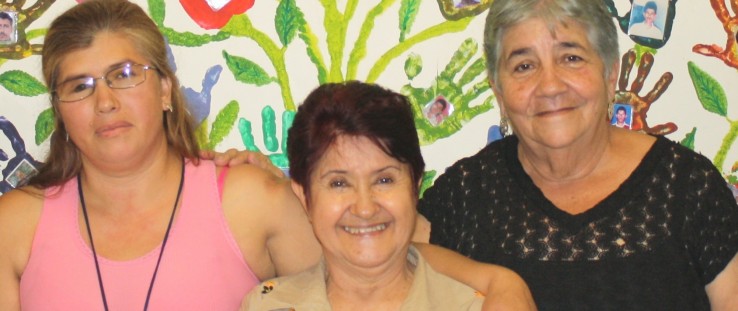 Left to right: Amanda Gallego, Teresita Gaviria and Maria Dolores Londoño are all part of Madres de La Candelaria, an organization that supports justice and reconciliation for victims of Colombia’s long-running conflict.
Angela Rucker, USAID
Left to right: Amanda Gallego, Teresita Gaviria and Maria Dolores Londoño are all part of Madres de La Candelaria, an organization that supports justice and reconciliation for victims of Colombia’s long-running conflict.
Angela Rucker, USAID
 Left to right: Amanda Gallego, Teresita Gaviria and Maria Dolores Londoño are all part of Madres de La Candelaria, an organization that supports justice and reconciliation for victims of Colombia’s long-running conflict.
Angela Rucker, USAID
Left to right: Amanda Gallego, Teresita Gaviria and Maria Dolores Londoño are all part of Madres de La Candelaria, an organization that supports justice and reconciliation for victims of Colombia’s long-running conflict.
Angela Rucker, USAID
Speeches Shim
MEDELLIN, Colombia—Madres de La Candelaria is an organization of and for victims of the violence and conflict that has plagued Colombia for over 50 years, and is supported by USAID. The madres, which means “mothers” in Spanish, provide a voice for victims across the country and at peace talks in Havana between the Colombian Government and the FARC rebels. Today, when Colombia is closer than ever to reaching an agreement with the rebels, these women are betting on reconciliation as a strategy to build a future.
FrontLines: How and when did you decide to create Madres de La Candelaria?
Teresita Gaviria: The organization was created on March 19, 1999, in response to the many disappearances and kidnappings taking place in Colombia. I began participating in and organizing marches against kidnapping.
In Colombia, everyone spoke aloud of kidnappings, but forced disappearance was very different. When someone is kidnapped, the family gets news of the kidnapped person because the perpetrators are seeking a ransom. In contrast, in the event of a forced disappearance, a person is dead in life; there’s no more news from the missing person.
In the early nineties, Francisco Santos [a Colombian politician and journalist] was kidnapped and the country was paralyzed looking for him. But no one cared about the sons of poor women; the majority of missing persons are the sons of farmers or salaried employees. During the marches, I met five families with disappeared sons. I kept their phone numbers and, in 1998, when my son disappeared, I contacted them and we began working.
Years before, I had the opportunity to travel to Argentina and met the Mothers of the Plaza del Mayo. I thought that we should do something similar—stand in a public place and shout “we want them alive.” But that was not easy. We faced many obstacles starting the organization. We were not allowed to protest anywhere; people considered us a military target. We wanted to stand at the Parque Berrio metro entrance, but the manager refused without even looking me in the face: “No. Don’t put that crap near the metro entrance.”
When I left, I felt humiliated; the first thing I saw was the church of Nuestra Señora de La Candelaria. The bishop came out and saw me crying with the other women. I told him: “Father, we come to ask you to let us stay here in the church foyer and shout that we want our sons back.” We told him our stories and after hearing us, the bishop said: “Go ahead. It’s yours!”
We shouted slogans like “we want them alive, free and in peace,” “they took them alive, and we want them back alive,” and “we, the Madres de La Candelaria, are not part of the war and never will be.” Since that day, we’ve gathered on the church foyer every Friday for a half an hour.
The Asociación Caminos de Esperanza Madres de La Candelaria is an organization of victims of crimes such as forced disappearance, displacement, sexual violence, massacres and selective killings. The priority for us is the truth. Over 125 women from the organization have received academic training, completing elementary and high school, and some have received technical training. Currently, eight members are enrolled in a diploma course to become mental health promoters for victims. Sixteen and a half years ago, we were seven women. Today, we are 882 people.
FL: What is your personal history and how did you become part of Madres de La Candelaria?
Gaviria: My son has been missing for 17 years. In total, 13 people in my family are missing or were murdered. When I was separated from my son, I had three options. First, become a drug addict and die in the street. Second, lock away the pain and die. Or third, ask for help. I met with other women and we began to rebuild each other. Today, these women are my daughters; I would give my life for them. And those people who are missing are my grandchildren. I made a commitment from day one never to abandon the foyer of the church until the last disappeared person in Colombia is returned.
Maria Dolores Londoño (Lola): I lost my first son in July 1990. He was 23 years old when he was murdered. Scared because of his brother’s killing, my other son left for Bogota to find better work. He left and to date I have not been able to find him. He was 24 when he left. That was 25 years ago. So in one month, I lost two of my children, but that was only the beginning of my pain and sorrow. Fifteen years ago, my third son was also killed. He went downtown to sell the clothes I sewed and he didn’t return that night. When he was planning to stay out, he would call me and ask for my blessing. But that day there was no call.
I was left alone with my four daughters as head of the household. I sewed to make our living. I used to go and sell a blouse or pants to buy breakfast for the girls. But I was so sad that, when I went to sleep at night, I would think to myself: “Tomorrow I’ll make a sancocho [stew]. I’ll poison it and I’ll feed it to my kids, and then I’ll have some too.” But God had a different plan for me, because he never let me do it.
I came to Madres de La Candelaria in 2002 at the invitation of a friend of mine. Her son and grandson had also been murdered. At first I sat in a corner. I did not want to talk to anyone. But as we began to share stories with each other, I began to feel more confident, and I also started to feel better. We started to look at each other as family.
Amanda Gallego: I am a victim of a massacre that occurred on Oct. 7, 1993, in Cocorná, in the village of Carmen de Viboral [Antioquia]. A massacre committed by the EPL guerillas. They killed my father, my mother, one of my sisters, and they left me as you see me now: a bullet through my head and hacked by a machete in one arm. I lived because they thought that I was already dead. I woke from a coma eight days later to find out that [most of] my family was dead, that I had lost an eye, and that they were looking for me to finish what they started. I was 21 years old. As I was wanted by the guerillas for surviving, no one would help me. I wanted to die.
On Nov. 28, 1998, the paramilitaries killed one of my brothers who had survived the massacre. A year later, the ELN guerrillas kidnapped my other brother when he revisited our village to ensure our safe return—he has been missing for 16 years. Losing them both destroyed me. I said: “If I have to die, I’ll die.” So, although it was a great risk for me, I denounced the case [reported the disappearance to the authorities]. Then I heard about the Madres de La Candelaria. Teresita and the others were planning a march in my village so I joined them. I met Teresita and told her my story. Since then, I have found my safe haven.
FL: Why do you believe truth and memory are important elements of reparations for victims?
Gaviria: Once we were invited to an event in Rionegro. There, Carlos Gaviria [Colombian politician and ex-magistrate] told us: “Women, the first thing you have to do is forgive and forget.” When he said that, I stood up and said to him: “Excuse me, doctor, but you were born to privilege. We were born on farms, and we’ve had to work hard selling goods from door to door in order to raise our children. We’ll be glad to forgive, although that’s going to be a long process. But forgetting is not an option. We will never forget, doctor. And the national history of Colombia is made of our memory.”
Londoño: I ask the perpetrators to tell us where the mass graves are, because it is an enormous relief for us to know where to find our loved ones. When you have a missing person, you see people who look like them everywhere: When you are watching TV, you expect your child to suddenly appear. Finally, though, when they are delivered to you—even though it’s only bones—then you know.
FL: What type of reconciliation activities are you carrying out?
Londoño: We began with visits to the prisons to meet with criminals where we participated in reconciliation activities organized by the Victims Unit. We went to the Bellavista and Itagüí prisons. Inmates asked us for forgiveness and gave us information about the locations of several mass graves where we might find some of our missing relatives.
Upon arrival at the prisons, we were full of hatred. But as they told their stories—sharing with us details of their childhoods and the difficulties they had endured—we began to think that perhaps hate is not the answer. Although they have caused a lot of pain, they are human beings just like us, and it’s never too late to change.
Now I even enjoy going to visit them in the prison. I even adopted three ex-combatants as my children. Not officially, but for me they are my children. I call one of them Oscar, after the last son I lost. Another who was recently released has family and children. He tells me that his children would like to meet me because he didn’t have a mom, that his family was killed when he was very young. He suffered a lot and joined the illegal group seeking only revenge. He did a lot of damage and killed many people. One day he killed a man and, when he was searching his clothes, he found a picture of that man’s family. He realized then that this was his story. That was enough for him. He decided to step back. He demobilized and faced the law.
FL: Why is reconciliation important for Madres de La Candelaria?
Gaviria: Because it heals. Reconciliation has a healing power. When a person forgives, they become free of bitterness and hatred. Although the pain lingers, there is also a sense of freedom. Through reconciliation you can reach the truth.
Londoño: I am very grateful to have met with ex-combatants in prison. Through these meetings, I’ve realized that I can’t judge them. We recognize that harboring rancor and hatred will never help us achieve peace. Maybe I won’t live to see peace—because I’m too old—but I’d be very happy if my 10 grandchildren and my four great-grandchildren could avoid the life I’ve lived, and that they can live in peace. That’s what I ask of God every day.
This interview has been edited for length.
Forced Disappearance—A Crime Against Humanity
USAID has been providing support to Madres de La Candelaria since 2008 to enhance the organization’s capacity to channel the voice of the victims of forced disappearance and have an impact on policy. One of their main accomplishments was the inclusion of forced disappearance as a crime in the Colombian penal code in 2000, making it not only an individual crime, but a crime against humanity, deserving of the most severe penalties. In Colombia, the crime has been committed by all armed groups including, according to the Colombian National Center for Historical Memory, by state armed forces and paramilitary groups.
Forced disappearance is committed to erase traces of previous crimes and as a means to threaten and exercise control over populations by creating fear and shredding social fabric. The Government of Colombia has officially registered over 45,000 cases of forced disappearance during the past 30 years. In contrast, the estimated number of forced disappearance cases in Chile and Argentina during dictatorships in the 1970s is 11,000.

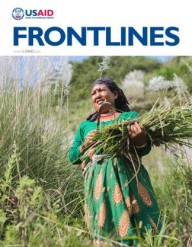

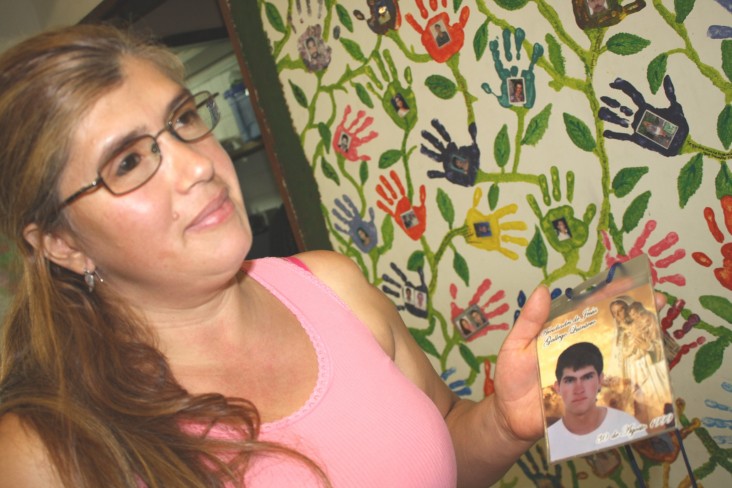
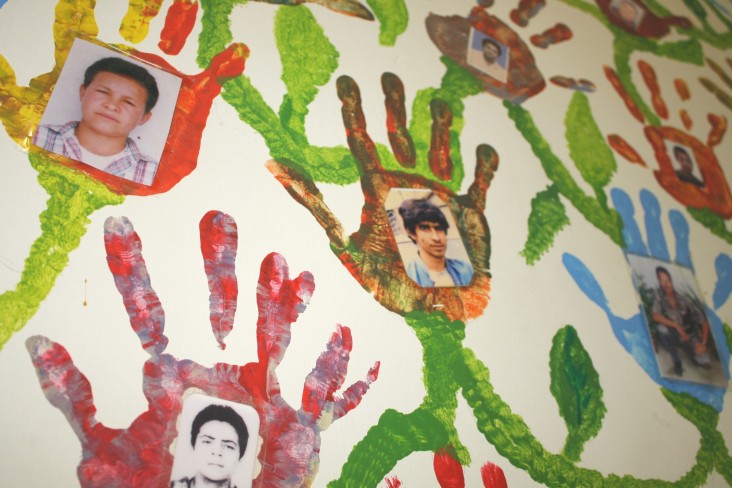
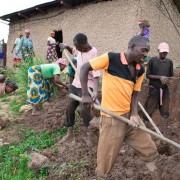
Comment
Make a general inquiry or suggest an improvement.